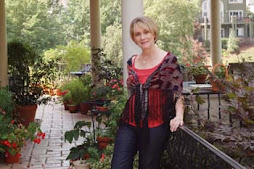 Understanding my upbringing has been a lifelong pursuit. One of the most difficult people to understand was my mom. I still have a mental snapshot of her bent over her flower beds. She instilled in me a love of the earth and taking care of what God has given us. I still can’t stand littering and in the spring I obsess over getting those first annuals in the rich black soil I had delivered before the moving boxes were even unpacked.
Understanding my upbringing has been a lifelong pursuit. One of the most difficult people to understand was my mom. I still have a mental snapshot of her bent over her flower beds. She instilled in me a love of the earth and taking care of what God has given us. I still can’t stand littering and in the spring I obsess over getting those first annuals in the rich black soil I had delivered before the moving boxes were even unpacked.But my mother had a secret anger that simmered out of the sight of polite company. It would waylay my sister and me, and I’m sure, the brother I never knew. Hurricaning is an unhealthy practice birthed of rage, pumping adrenaline into the body even giving the person a temporary high. It can cause you to feel powerful. In cartoons, it is the character who suddenly reveals their evil side, rising into the air like a giant Medusa with thunderclouds and lightning billowing behind.
Raging at a spouse or children can become addictive. It is often a trait of the Alpha personality or the choleric, the ones who are prone to heart attack and stroke early in life, but anyone can fall into a rage. In short, hurricaning is bad for the body physically and destructive to a happy home life. I remember moving out at the age of eighteen, looking around my little rent house and thinking, “Peace and quiet—finally.” My mom and I were only able to know each other on a surface level because as a young person I could not feel safe to confide in her. When my father followed suit, hurricaning when I applied to an out of state college, my response was to move out of our home, fearful that I would never know safety if I didn't. Confidence in a relationship is based upon a healthy mutuality and a sense of safety. We want our children and spouse to respect us, but how we go about earning that respect will determine the health of our relationship.
Truthfully, it takes time to build a relationship. It takes two parties walking in agreement. Getting our kids to sign on is reliant on our pursuit of mutuality and that means changing the language we use to motivate others to invest in our missions. I have one last caboose in my life, my teenage son. I was justifying the friction between us by saying that his testosterone was getting the best of him—and that is true. But God tapped me one day when I was sort of grumbling about him in prayer. He asked me to consider why I was so troubled. I knew why—I’m afraid he’ll make a poor choice at the precipice of adulthood that will take years to undo. The keyword, God showed me, was “afraid.” He gave me a new benevolent tool--communicating out of my beliefs instead of my fears. The next morning on the way to school instead of nagging him and then both of us losing our temper, I reworded what I wanted to say to him out of my beliefs instead of my fears. To do that, I had to know in advance what I believed. It changed the entire mood and my tone. We were laughing and chatting like two adults when he got out of the car and went into his school. By refocusing my platform, I killed the hurricane.
The hard part is doing that every day with my child, my husband, the people who work alongside me in ministry. That will require prayer and my surrendering what I feel is right for my relationships back to God—and that means reconciling myself to mutuality with God








